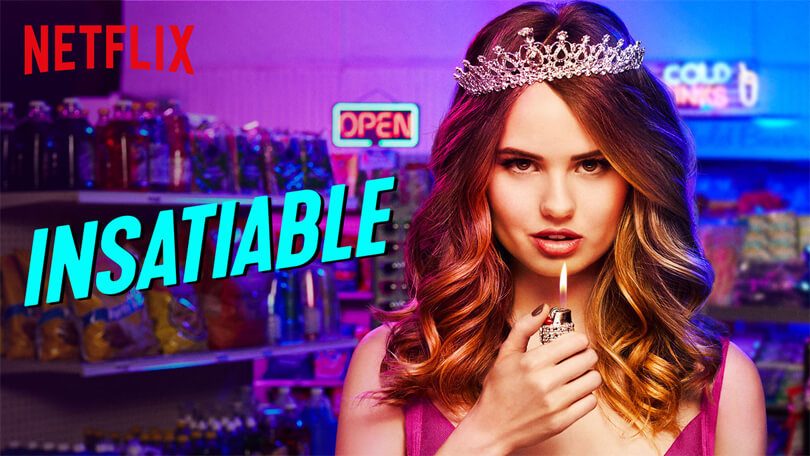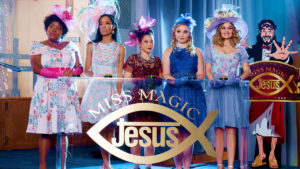
 INSATIABLE
INSATIABLE
Created by: Lauren Gussis
Starring: Debby Ryan, Dallas Roberts, Kimmy Shields, Alyssa Milano
Review by: Nick Schofield
(CW: discussions of racism, homophobia, pedophilia, body shaming, sexism, etc.)
So, Insatiable. Let’s talk about this show.
Before we dive in, I’d like to preface with a warning: this review will wander into some very personal territory. I’m a cisgendered white man, but I’m obese, and there are parts of my experience Insatiable reflects. For this review, I’d rather restrict my thoughts regarding the themes of the show, the experience of its characters to those points rather than trying to make grand statements, and generalizations as a whole.
I strongly encourage anyone who’s reading this review to go read what other critics have to say, including Roxane Gay, Constance Grady, Alison Foreman, Jen Chaney, Sonya Saraiya, and others. You’ll notice I included entirely female critics in my recommendations. I found many of the male perspectives on Insatiable warmer to the show than their female counterparts. I encourage you to seek out those perspectives too, but there’s a pattern worth keeping in mind.
First and Foremost, This is Not a Good Show
The Netflix series Insatiable follows Patty Bladell (Debby Ryan) and her journey from obese girl to pageant royalty. After her jaw wired shut from a violent run-in with a homeless man, Patty loses weight and transforms into a beauty queen. She teams up with Bob Armstrong (Dallas Roberts), an eccentric lawyer with a penchant for coaching pageant queens and constantly finding himself in compromising situations. With Bob at her side, Patty hopes to exact her revenge on all the people who ever did her wrong when she was fat by winning Miss American Lady.

Insatiable checks off a lot of awful boxes on the “How Bad is This Show?” checklist. Strewn about it are jokes that span the gamut of homophobia, racism, child rape/pedophilia, body shaming, and so on. The child rape/pedophilia jokes are a whole subplot of the show. It’s so incredibly couched in the patriarchal nonsense Insatiable somehow seeks to rise above as to be laughable.
As far as plotting and characters are concerned, the show doesn’t fare well either. Granted, this show is another manifestation of the teen genre so it can be a little more lax in how it handles these two elements, but it can’t really manage its ensemble and season arc much at all. Characters shift in attitudes and opinions constantly (though I give the teenagers a break with this), and plot points come in and are dropped/resolved without really impacting the overall story. Insatiable is determined to build to a crescendo with more and more ridiculous plot twists and wants to get there despite character continuity and audience buy-in.
Why Insatiable Isn’t Satire
The show has been billed by Lauren Gussis–the show’s creator–and Netflix as a sort of romping satire that takes no prisoners. While I admit Insatiable is able to accomplish some semblance of satirization in a few key moments, the jokes, for the most part, play as incredibly tone-deaf.
Satire works when aimed at power and the stupidity of that power’s vices or beliefs. Infamous works of satire–like Jonathan Swift’s “A Modest Proposal” (sorry for going English Major nerd on you right now)– take contemporary attitudes of groups such as the wealthy or the pious and turn them on their head to show just how stupid and ridiculous they are. Not only that, but great satire also shows how those attitudes negatively impact the disenfranchised.
You, for sure, cannot say the same about Insatiable. It wants to take irony and paradox and pass it off as satire without doing the homework satire involves. It gives off this self-effusive notion that it’s this masterwork of a really difficult genre of humor when the opposite is true. The attempts it makes are sloppy, inconsistent, and tone-deaf. To be fair, there are some satirical moments, but they’re the exception that proves the rule.
The greatest piece of satire in the show revolves around the Miss Magic Jesus pageant, the competition Patty has to win before she can get into Miss American Lady. The pageant is blissfully unaware of itself, and the result is hilarious. Insatiable delivers a great satirical moment by knocking religious institutions’ attempts to stay “hip.” However, the moment is short-lived.

Stereotypes Aren’t Humor
Another issue with the humor in Insatiable is that it plays to racial, gender, sexual, body type, and other stereotypes to garner laughs. Repressed and unrecognized attraction/sexuality is a punchline over and over again. All the young men always seem to have sex on their minds (granted, this isn’t necessarily an inaccurate representation, but teenage boys are not one-dimensional); the pageant girls are bitchy and conniving, and the list goes on. While the dressings of these characters have changed (the show does a decent job at trying to bring in a more diverse cast) they’re still based in outdated models that have fallen out of favor.
A good writer can find ways to use stereotypes for humor without falling into their value judgments and flat depictions of complex human characters. When the stereotype is the joke, then that’s just lazy writing. The latter approach takes little imagination; the former requires effort for good execution. I’m not sure if the writers of Insatiable were too focused on the crescendo of the first season to build more complex humor into its characters. Whatever the case, the end result is disappointing.
A Bad Show, But An Honest One
I had to read Insatiable the riot act before I got to this point because the truth is: as problematic as the show is, it presents particular experiences and themes in very honest and impactful ways. I believe, as problematic as the show is, there is some merit and value to it worth exploring.
There are two themes around obesity in the show I want to discuss briefly–pain and legacy. These themes aren’t explored deeply; however, they do see moments in the sun. As well, they function as frank reflections on the obese experience, more so than anything I’ve seen before.
Emotional Pain and Obesity
In the show, there’s a handful of moments where Patty manages her emotional pain by eating. At the end of Episode 10, she’s so overwhelmed that she tears into her birthday cake just to numb herself. In her last lines of the episode, she says:
“So who cared what I ate? I just didn’t want to feel this pain. I didn’t want to feel anything at all, so I turned to the only friend I had left.”
After she blows out the candles and digs in, the frame focuses on Patty’s face and zooms in slowly. Ethereal music underscores the scene initially, but it gives way to Patty crying and chewing. The frame eventually cuts to black, but Patty’s chewing and crying linger on until the credits.
This last scene is powerful. It causes discomfort within the viewer and portrays a raw truth about eating disorders. I have done what Patty did in that moment, felt what she felt, and desired that same numbness. In a world where your body both a spectacle and an island, you disappear. There’s nobody to rely on, except that one trusty friend: food.
Until now, I haven’t seen anyone else communicate this experience in such a powerful and honest way. It’s a lens into what the life of someone struggling with obesity really looks like. The scene also clarifies an often misunderstood point–overeating can act as a coping mechanism.

A Legacy of Body Size
At the end of the end of Insatiable’s first season, Patty finds herself kidnapped and about to be murdered by Stella Rose (Beverly D’Angelo), an ex-lover/competitor of her coach Bob. Stella Rose forces Patty to write a suicide note as she begins staging her death, dictating a narrative that Patty took her life once she was unable to numb her pain with food anymore. Patty refuses, exclaiming that she’s no longer that person, to which Stella Rose retorts:
“Bullshit. You’ll always be Fatty Patty. That’s your legacy.”
Patty’s realizes the story of her as the poor, pathetic Fatty Patty is what she’s been told all her life. However, it only has power if she believes it. She now has an opportunity to rewrite it–if she can escape, that is.
This realization is a powerful message to sit and reflect upon. Her struggle with her legacy mirrors my own, and it’s not something I feel the average-sized person can grasp. The fact it’s included in this show is really remarkable.
A Real Mixed Bag
Insatiable is a complicated show. It tries to appeal to modern sensibilities while throwing us tropes and stereotypes that have since left the stage. In many, many instances it fails to treat certain subjects with the nuance and gravity they deserve. This results in a tone-deaf, cringe-worthy experience for audiences. It spins out of control at times, and a lack of consistency–or taut narrative threads–make it difficult to follow.
Simultaneously, it’s attempting to have intimate conversations with the audience, candidly portraying certain experiences of its characters. I cannot explain the strange joy of seeing aspects of my own life reflected in an artistic work. I feel my experience has been respected, and that it is valuable enough to depict honestly.
Verdict: Wait and See.
Because Insatiable is such a mixed bag, it would seem like it would be difficult to condemn or laud it either way. It’s problematic, and we should hold it accountable. But it has genuine, valuable moments worth our attention. Until the show can pull itself out of its problematic behavior, not much can redeem it. However, Insatiable is still a fresh, young show. There’s a chance it could grow into something better than it was, make amends for its past, and present a deeper, richer tapestry for us to explore. That hope is small, but I think it’s worth holding onto.
Also, be sure to take my critical response to Insatiable with a grain of salt. There’s a whole aspect of gender and body that I am privileged from having to experience, and there’s a possibility I’m missing a whole dimension to the story that makes my point moot. Again, I encourage you to read other reviews from a diverse background of critics and make your assessment from there. And, if you think I’ve missed the mark on something, please let me know! I’d love to discuss this show with anyone who’s willing.



